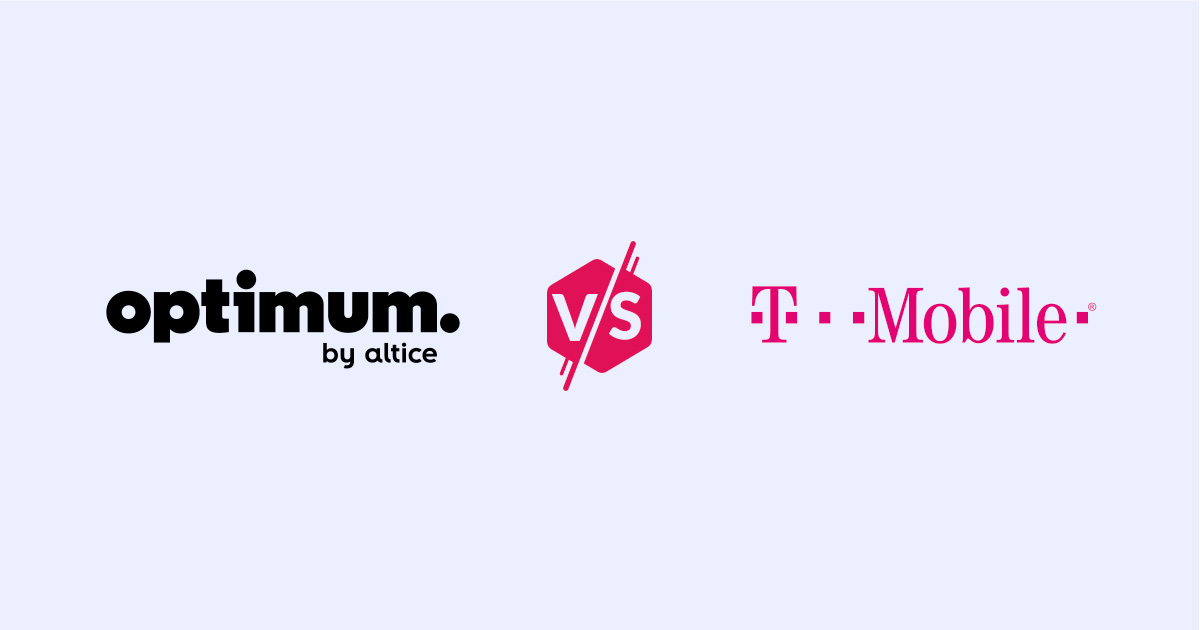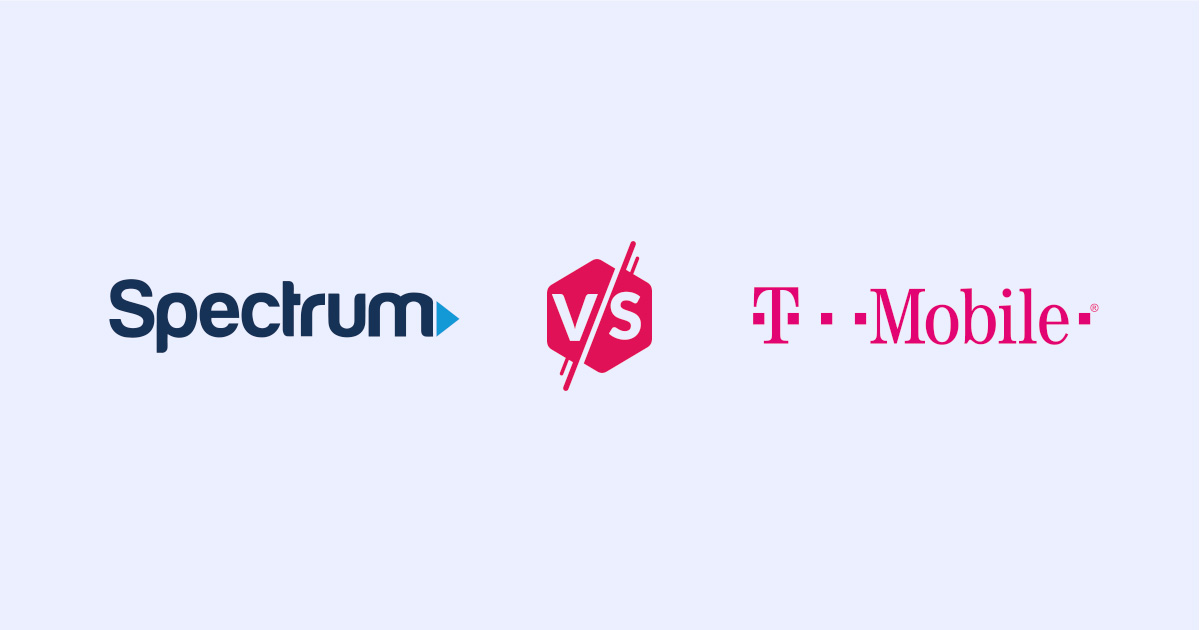T-Mobile vs. Viasat: Which Internet Provider Is Best for You?
Comparing two providers who have shaken up the telecom industry in different ways.
Jun 14, 2024 | Share
Brand Guides, Provider Comparisons (Versus)
-
Best speeds
- Customer rating: 4.1/5*
- Price: $50.00–$70.00/mo.†
- Speed: 72–245Mbps
- Internet type: 5G Home
- Data cap: Unlimited
- Contract: None
-
Best availability
- Customer rating: 3.1/5*
- Price: $99.99–$119.99/mo.‡
- Speed: 50–150Mbps
- Internet type: GSO Satellite
- Data cap: Unlimited
- Contract: 2 years
Data as of 6/14/2024. Offers and availability may vary by location and are subject to change.
*Based on our annual Customer Satisfaction Survey
†w/ Auto Pay. Regulatory fees included in monthly price for qualified accounts. See full terms. Delivered via 5G cellular network; speeds vary due to factors affecting cellular networks, including data prioritization.
‡ Prices and availability vary by location. Installation fees, monthly equipment lease fees, and taxes may apply. After 100 GB of High-Speed Data usage, you still have unlimited access to Standard Data, which may result in slower speed.
Compare T-Mobile and Viasat head-to-head
T-Mobile and Viasat both provide wireless internet; however, there are important differences between satellite and cellular connections. Although the two providers have a considerable overlap in speeds, T-Mobile plans will always have much lower latency than Viasat plans.
Viasat offers more speed than other satellite providers, but it comes at a cost. Viasat is generally a bit slower T-Mobile, though there’s a considerable amount of overlap in the two ranges. Viasat is also much more expensive. Neither have data caps or long-term contracts, which are two big factors when choosing an internet provider.
Want to know if T-Mobile 5G Home Internet or Viasat are in your area?
Enter your zip code below to see if these two providers are available in your area.
Plans and pricing: T-Mobile vs. Viasat
T-Mobile and Viasat are both notable for their simple, straightforward pricing methods.
T-Mobile plans and pricing
| Package | Price* | Speed | Details |
|---|---|---|---|
| T-Mobile 5G Home Internet Unlimited | $50.00/mo. | 72–245Mbps | |
| T-Mobile 5G Home Internet Plus | $70.00/mo. | 72–245Mbps |
Data as of 06/14/2024. Offers and availability may vary by location and are subject to change.
*w/ Auto Pay. Regulatory fees included in monthly price for qualified accounts. See full terms. Delivered via 5G cellular network; speeds vary due to factors affecting cellular networks, including data prioritization.
T-Mobile’s 5G Home Internet plan is a solid choice, especially in rural areas. It even contends with some wired plans like DSL, giving you good value in terms of speed versus cost. T-Mobile also has unlimited data, which is rare among wireless providers.
Although T-Mobile’s 5G network can reach high speeds, the highest speeds are not available across the entire T-Mobile coverage area. Remote areas where people rely on wireless connections will have lower speeds compared to customers in larger cities. T-Mobile provides the fastest 5G speeds in urban areas, but these areas are also more likely to have access to cable and fiber connections, which reach much higher speeds.
Viasat plans and pricing
| Package | Price | Speed | Details |
|---|---|---|---|
| Viasat Unleashed | $99.99–$119.99/mo.† | 50–150 Mbps |
Data as of 2/29/2024. Offers and availability may vary by location and are subject to change.
†Prices and availability vary by location. Installation fees, monthly equipment lease fees, and taxes may apply. After 150 GB of High-Speed Data usage, you still have unlimited access to Standard Data, which may result in slower speed.
*Offer available to new qualifying customers. One-time standard installation fee may be due at checkout. Minimum 24-month service term required. Equipment lease fee is $14.99/mo. Taxes apply. Speeds are “up to,” will vary and are not guaranteed. Service is not available in all areas. Offer may be changed or withdrawn at any time.
Viasat has just one plan, Viasat Unleashed, though speed and pricing vary by region. This plan comes with unlimited data, which means you don’t have to worry about many of the issues satellite internet has historically dealt with, such as overage charges, throttling, or having your connection deprioritized in favor of other users who pay for a premium experience.

Deals and promotions: T-Mobile vs. Viasat
Get the Unlimited Gold 50 plan for $99.99 per month so you can have 200 Mbps speeds and a modest 50 GB of data.
Extra fees: T-Mobile vs. Viasat
| Equipment Fee | Installation Fee | Other Fees | |
|---|---|---|---|

| None | Self-installation | None |
| $15.00/mo. | $0.00–$300.00 professional installation | $250.00 Lifetime Lease option |
T-Mobile doesn’t have extra fees on top of its monthly bill, which is great. T-Mobile customers do have to self-install their equipment, but they make this a fairly easy process, even for those who have never done it before. The T-Mobile app will walk you through the process from start to finish.
Viasat comes with free professional installation with credit approval, which is really nice, if you qualify. Its monthly equipment rental fees are relatively low, though unfortunately for Viasat, low doesn’t beat free.
Customer ratings: T-Mobile vs. Viasat
| Overall Rating | Speed | Price | Reliability | Customer service | |
|---|---|---|---|---|---|

| 4.1/5 | 4.0/5 | 4.1/5 | 3.9/5 | 4.1/5 |
| 3.1/5 | 2.9/5 | 2.6/5 | 2.9/5 | 3.3/5 |
T-Mobile was the highest ranked among nationwide providers in our annual customer satisfaction survey, blowing the competition out of the water in overall satisfaction. T-Mobile has been putting a lot of work into its pivot into home internet, and all that effort seems to be paying off.
We didn’t receive enough responses from Viasat customers to include it in our nationwide rankings; however, those who did respond gave low scores when compared to other providers. Since there were so few responses, these results should be taken with a grain of salt, but it does paint a stark contrast between the two providers.
Internet types: T-Mobile vs. Viasat
T-Mobile provides 5G home internet, which is a new and promising wireless internet technology. 5G uses cellular technology, and it’s a great way to deliver wireless home internet due to its high top speeds. These speeds, however, are not available across T-Mobile’s entire nationwide footprint.
In sparsely populated areas further from urban centers, 5G providers use different bands of radio frequencies to increase the number of households they can reach. This results in a wide range of advertised speeds with customers in rural areas getting slower speeds and those in urban areas with more 5G infrastructure getting higher speeds.
Installation: T-Mobile vs. Viasat
T-Mobile doesn’t offer professional installation, opting for free self-installation instead. T-Mobile equipment is designed to be easy to set up. T-Mobile provides an app to walk you through the process, so you don’t need an expert to get through the installation.
Viasat provides free professional installation with credit approval. This is good because it involves mounting a satellite dish on your home, which is not a safe job for those without experience. The dish also has to be properly aligned to the satellite to get a good signal, so it’s ideal that Viasat will take care of that for new customers.
Availability: T-Mobile vs. Viasat
T-Mobile and Viasat are widely available nationwide, but satellite providers like Viasat can reach basically any home that has an unobstructed view of the sky. Not even cellular networks can match this kind of availability. This is why satellite internet is so essential, despite its many shortcomings.
Ready to make a switch?
Enter your zip code below to see if T-Mobile 5G Home Internet or Viasat is in your area.
Final call: T-Mobile vs. Viasat
In almost any situation, T-Mobile is the clear choice over Viasat. It’s cheaper Viasat and also has lower latency than Viasat. Its top speeds are also higher than Viasat’s.
The one caveat is that T-Mobile’s speeds get slower the further away from 5G infrastructure you get. That means that if you live in a very remote area and need the absolute fastest internet service available, Viasat might be the better, though very expensive, choice for you.
Methodology
Our HighSpeedInternet.com editorial team bases our analyses on customer input from our annual customer satisfaction survey, results from our speed test tool, and proprietary internet provider data on speeds and pricing. To strengthen our research, we look closely at provider contracts to get hard-to-find information on price hikes, data caps, and extra fees, and we keep tabs on the latest news reports and online reviews. When applicable, we also rely on our personal experiences testing these services.
Author - Peter Christiansen
Peter Christiansen writes about satellite internet, rural connectivity, livestreaming, and parental controls for HighSpeedInternet.com. Peter holds a PhD in communication from the University of Utah and has been working in tech for over 15 years as a computer programmer, game developer, filmmaker, and writer. His writing has been praised by outlets like Wired, Digital Humanities Now, and the New Statesman.




